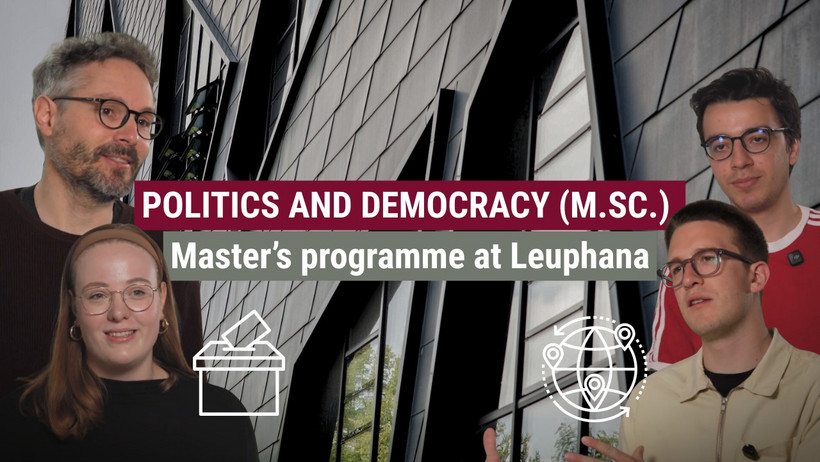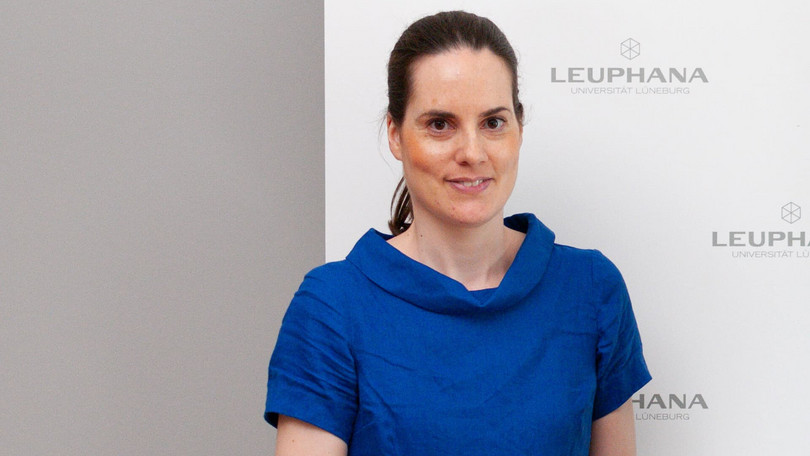Politics and Democracy (M. Sc.)
Masters Programme
Democracy is under pressure. The rise of populist parties, the accelerating spread of misinformation through social media and declining trust in democratic institutions challenges, or even reverses, democratic development. The increasing power of authoritarian states as well as their notable successes in promoting economic growth question the global understanding of democracy as the only legitimate form of government after the end of the Cold War. Does democracy have a future and what may this future look like? What does it take to establish a resilient democracy, and how may democracy decline or die? How desirable is democracy after all, including in regions outside of the democratic “West”? And can democracy be legitimately spread abroad?
This programme addresses these and other questions to provide students with the intellectual and methodological tools to understand, critique and improve democracy around the world. Through close collaboration with scholars from the German Institute for Global and Area Studies (GIGA) in Hamburg, this programme has a unique focus on democracy in both the Global North and the Global South.
At a Glance
- Degree awarded: Master of Science (M.Sc.)
- Application deadline: EU degrees: approx. 1 June / Non-EU degrees: 1 May
- Highlights: Democracy in the Global North and the Global South, rigorous methodological training, data and decision making analysis
- Is aimed at: Graduates of political science and related disciplines
- Type of programme: consecutive, restricted admission
- Study places: 25
- Start date: October 1
- Extent: 120 CP according to ECTS
- Duration: 4 semesters
- Language: English
- Semester contribution: approx. 450 EUR
Politics and Democracy – The Programme
Content
The Master's programme Politics and Democracy provides students with an intellectually rigorous, methodologically diverse and thematically broad training on democracy from a political science perspective. Focusing on international and global comparisons, it covers behavioural, cultural, institutional, international and normative-theoretical aspects of democracy. The programme enables students to think critically about the foundations of modern democracies and the contemporary challenges that democracies face amidst technological and social change – and ultimately to re-invigorate established and envision new forms of democracy.
The close collaboration with the German Institute for Global and Area Studies (GIGA) – an independent research institute in Hamburg, Germany, that specialises in the study of Asia, Africa, Latin America and the Middle East – provides this programme with a unique substantive focus on both the Global North and the Global South. Another unique feature is its rigorous and comprehensive training in qualitative, quantitative and experimental social science research methods.
The programme also teaches students the skills to conduct independent research on democracy through lectures, discussion-based seminars and hands-on tutorials. Elective courses – in the Electives and Leuphana’s unique Complementary Studies – allow students to specialise in different sub-disciplines of Political Science (International Relations, Political Sociology, Government, Comparative Politics and Public Policy) or to broaden their profile towards economics, sustainability science, law and cultural studies, enabling them to develop an interdisciplinary study profile. The close collaboration with the GIGA also affords students the opportunity to do internships or seek research assistant positions.
Scholars at the Institute of Political Science pursue an active research agenda on the domestic, comparative and international aspects of democracy. For several years, the Institute has been ranked among the best 300 political science departments worldwide in the Shanghai University Ranking. It is among the top-16 departments in Germany and ranks 3rd among the mid-sized political science departments in this country. The THE world university rankings for Politics and International Studies rank Leuphana University among the top-200 universities worldwide and among the top-12 in Germany in 2023.
Structure
In the first year, students acquire the substantive and methodological foundations to study democracy scientifically. They take courses on various aspects of democracy in the Global North and Global South alongside a programme of research methods training, which includes courses in qualitative, quantitative and experimental methods.
In the second year, students take additional substantive courses to deepen their understanding of democracy plus a research seminar in democracy studies, in which they develop and conduct their own research project, and write their Master’s thesis. The latter is accompanied by a Master’s Forum that allows students to discuss their projects with peers and lecturers.
Alongside their subject-specific and methodological training, students develop their individual study profile through two elective courses (2nd and 3rd semester) as well as the inter- and transdisciplinary Complementary Studies (1st – 3rd semester), in which students choose from among a variety of courses aimed at facilitating reflection on general questions related to knowledge, science and societal responsibility.
Here you can find further information on the course content of the Master's programme Politics and Democracy.
Study Regulations and Subject-Specific Schedule
The following link provides access to documents which set out the general conditions for examinations, an overview of the curriculum, as well as detailed and legally binding regulations.
General Assessment Regulations and the Subject-Specific Schedules
Teaching Personnel
Programme Director
- Prof. Dr. Tobias Lenz
Deputy Programme Director
- Prof. Dr. Natascha Zaun
Lecturers
- Prof. Dr. Sarah Engler
- Prof. Dr. Michael Koß
- Prof. Dr. Tobias Lenz
- Prof. Dr. Astrid Séville
- Prof. Dr. Christian Welzel
- Prof. Dr. Boris Hirsch
- Prof. Dr. Mario Mechtel
- Prof. Dr. Christian Pfeifer
- Prof. Dr. Florian Unger
- Prof. Dr. Jens Newig
- Prof. Dr. Harald Heinrichs
- Dr. Michael Rose
- Dr. Johanna Lorraine Breuer
- Prof. Dr. Miriam Prys-Hansen
- Prof. Dr. Thomas Richter
Video: Presentation of the programme by Prof. Dr. Zaun
Studying Abroad
Students of this Master's programme have the opportunity to spend a semester of their studies abroad. For that, we recommend the third semester.
For any questions or to apply, please contact the International Center. The International Center will provide all further information on Erasmus+ funding, and on preparing for and organising your semester abroad.
Career Prospects
There is a growing demand for future generations of decision-makers to understand and contextualise the conditions of democratic decision-making and to be able to analyse them independently using appropriate social science methods. Given the explosion of all types of data due to the “information revolution”, there is also a growing demand in many professional fields for people who can collect, present, and evaluate data. The high-quality methods training provided in the study programme meets this demand.
The study programme qualifies students for a wide range of careers, including professional, commercial, diplomatic, governmental and academic positions. Skills in data analysis and an understanding of democratic decision-making processes are increasingly important for work in the public and private realms, including positions in public administration, educational institutions, private business, consulting, political advisory work, public relations, diplomacy, international governmental and non-governmental organisations as well as journalism and the media.
The programme also equips students with the knowledge and skills to pursue further research and study at doctoral level, be it at Leuphana University or elsewhere. Students who would like to continue their academic career are welcome to apply for our doctoral research group on Political Science.
As a student of our Master's programme, you also have the opportunity to start your doctorate at an early stage via the Doctoral Track.
On the Leuphana Career Service website, you will find numerous job offers for student jobs, internships, career entry, or topics for your thesis from companies, research institutions, and non-profit organizations that are specifically aimed at Leuphana students and graduates. In addition, you will find job offers and student jobs within Leuphana University.
Doctoral Track
As a student in our programme, you have the opportunity to start your doctorate early via the Doctoral Track.
Thus, you to become part of the scientific community of our doctoral research groups at an early stage, giving you the unique opportunity to combine your Master's and doctoral studies and, with your doctorate in sight, to obtain your Master's degree en-route.
Admission Requirements and Application
You can find all information about the admission and requirements, the application and the selection procedure on our "Admission and Requirements" page.
International Students
This study programme matches your interests? Then you will find further information for prospective international students on residence and social matters, such as visa, residence permit, health insurance or finding accommodation, on the following pages.
Please note that the information for incoming exchange students and international degree-seeking students differs slightly.
Contact and Counselling
First contact point
The Information Office (Infoportal) is your contact point for
- general information on the application procedure
- initial questions about the study programmes offered at Leuphana
- making an appointment with the Graduate School Student Counselling Service.
Information Office
Building 8, Ground Level
Fon +49.4131.677-2277
studierendenservice@leuphana.de
Campus opening hours
Mon - Thu 9.00 am - 4:00 pm
Fr 9.00 am - 12 noon
Student Counselling
To make an appointment with our Student Counselling Service, please use our booking tool on our website.



